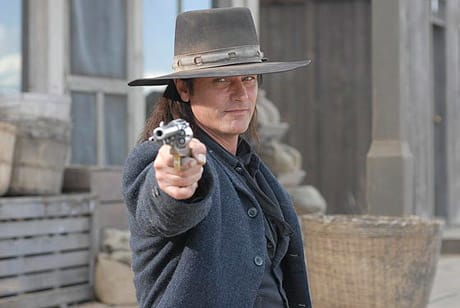Back in 2003, writer/director William Phillips dumped Foolproof into theatres: a fairly benign piece of Can-Con starring Ryan Reynolds and Kristin Booth that flailed frantically to pass itself off as a real-deal Hollywood heist flick. Nobody bought it and the film bombed (critically and commercially). Seven years later, Phillips offers Gunless as a moderately sly response to the dreary domestic box office that met Foolproof (and so many other earnest, if unremarkable, Canadian genre films of similar ilk).
Gunless stars the Hollywood handsome Paul Gross as the Montana Kid, a hardened American gunslinger who finds himself cast away in the oppressively well-mannered Dominion of Canada. Riding into town unconscious, hanging from the back of his horse, with a noose still attached to his neck, in one the film's three laugh-worthy sight gags, Gross's grizzled buckaroo finds himself assaulted by the civility of the bucolic Canadian community, staying so long as he can repair the town's one pistol in order to defend his honour against the local brick shithouse blacksmith (Tyler Mane).
The film tries to have a lot of fun ribbing Canada's reputation as a courteous cousin to the hang-'em-high vigilance of the American West. But what should have been an inoffensive two-minute Air Farce sketch about a desperado-out-of-water drags on for 90 or so unbearable minutes, peppering in the requisite do-right Mountie (Dustin Milligan), bounty hunters (led by Callum Keith Rennie), distressed damsels (Sienna Guillory) and aboriginal sidekicks (Graham Greene, shrugging his way through his own on-screen persona, and in doing so effectively personifying the strained sense of desperation that defines the entire film).
The problem with Gunless is that it has no idea what it wants to be, randomly oscillating between City Slickers-styled Wild West lampoonery and stabs at Cormac McCarthy-isms about the nature of manhood and lawlessness. But what's worse is its self-consciously clever kowtowing to reified notions of Canadian identity.
It shouldn't be impossible to productively salvage Western movie tropes in the service of national allegory — look at John Hillcoat and Nick Cave's The Proposition (2005), which effectively transposed the mythos of the morally desolate bounty hunter onto the landscape of an ungovernable Australian outback — but the ever-winking Gunless only contributes to Canadians' apparent inability to take ourselves, and especially our national cinema, seriously.
(Maple)Gunless stars the Hollywood handsome Paul Gross as the Montana Kid, a hardened American gunslinger who finds himself cast away in the oppressively well-mannered Dominion of Canada. Riding into town unconscious, hanging from the back of his horse, with a noose still attached to his neck, in one the film's three laugh-worthy sight gags, Gross's grizzled buckaroo finds himself assaulted by the civility of the bucolic Canadian community, staying so long as he can repair the town's one pistol in order to defend his honour against the local brick shithouse blacksmith (Tyler Mane).
The film tries to have a lot of fun ribbing Canada's reputation as a courteous cousin to the hang-'em-high vigilance of the American West. But what should have been an inoffensive two-minute Air Farce sketch about a desperado-out-of-water drags on for 90 or so unbearable minutes, peppering in the requisite do-right Mountie (Dustin Milligan), bounty hunters (led by Callum Keith Rennie), distressed damsels (Sienna Guillory) and aboriginal sidekicks (Graham Greene, shrugging his way through his own on-screen persona, and in doing so effectively personifying the strained sense of desperation that defines the entire film).
The problem with Gunless is that it has no idea what it wants to be, randomly oscillating between City Slickers-styled Wild West lampoonery and stabs at Cormac McCarthy-isms about the nature of manhood and lawlessness. But what's worse is its self-consciously clever kowtowing to reified notions of Canadian identity.
It shouldn't be impossible to productively salvage Western movie tropes in the service of national allegory — look at John Hillcoat and Nick Cave's The Proposition (2005), which effectively transposed the mythos of the morally desolate bounty hunter onto the landscape of an ungovernable Australian outback — but the ever-winking Gunless only contributes to Canadians' apparent inability to take ourselves, and especially our national cinema, seriously.
